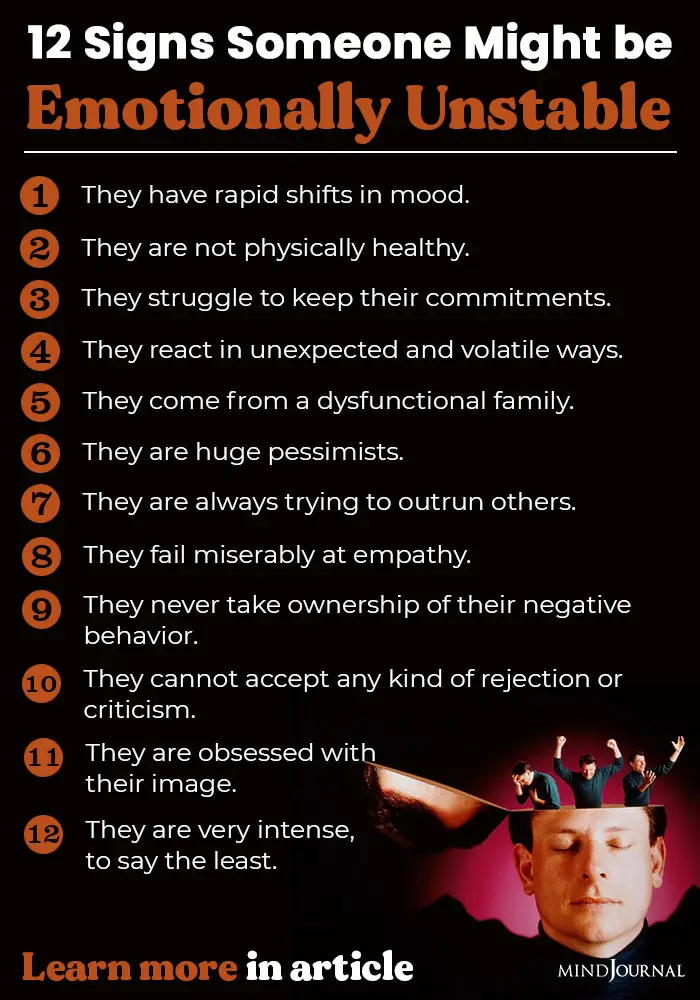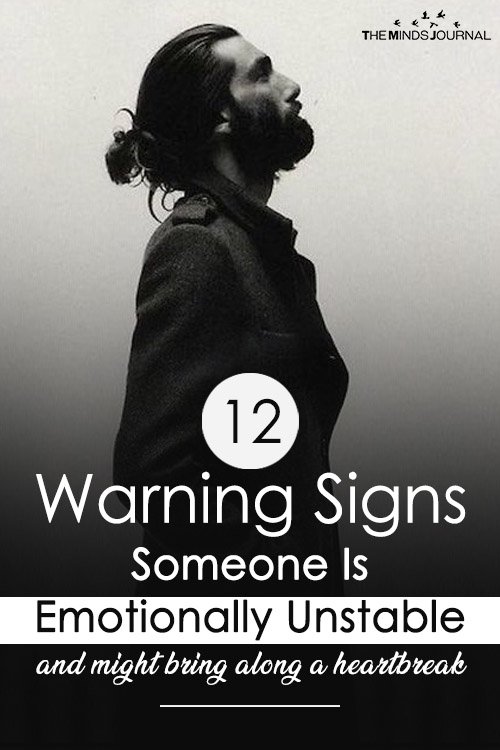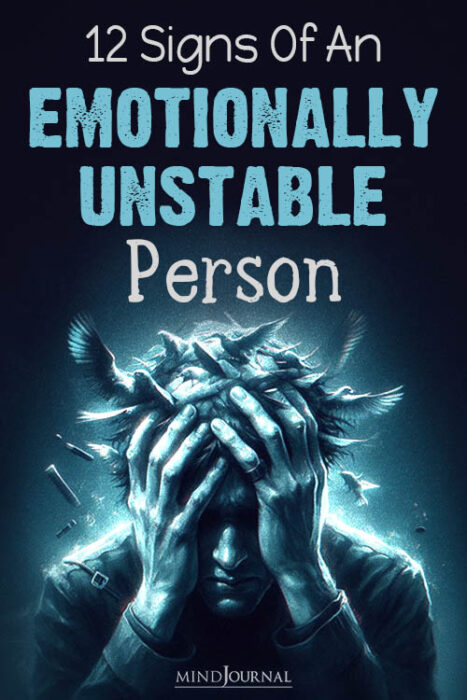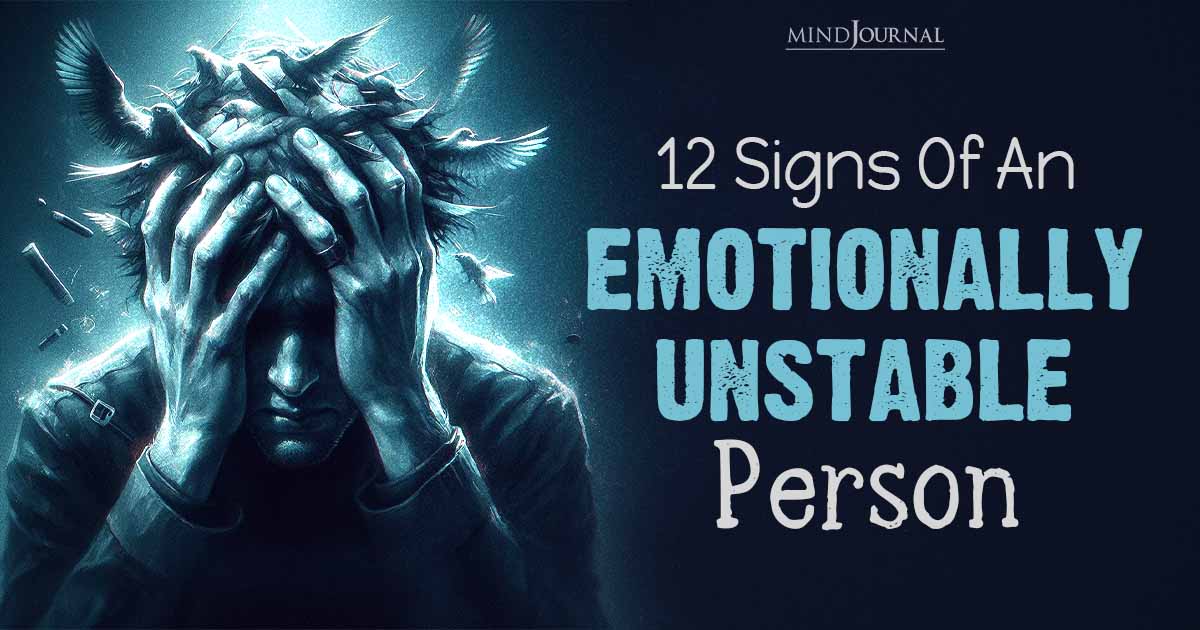Ever wondered about the signs of an emotionally unstable person? Join me as we explore 10 common indicators that might help you recognize emotional turbulence in someone.
When you get into a relationship, you are under the assumption that the person you are dating is emotionally mature and balanced. But sometimes you might discover later on that, that might not be true after all.
Turns out, someone can be quite emotionally unstable and you will have no way of knowing that, until later. And the person who is emotionally unstable will never be in a healthy mental and emotional place to nurture a mature adult relationship.
It’s a common thing to experience shifts in emotions because not every day and not every moment is going to be perfect. Life is an unpredictable thing and feeling angry, sad, depressed, and dejected at times is normal. But an emotionally unstable person, shows drastic reactions to events and have really unpredictable, and volatile emotions.
Here Are 12 Signs Of An Emotionally Unstable Person

1. They have rapid shifts in mood.
Having mood swings is a normal thing to experience and everyone goes through this sometime or the other. But when someone’s moods are shifting at an alarming and frequent pace, then it’s a sign that they might be emotionally unstable. They tend to experience a rollercoaster of emotions, and you will never be able to keep up with it.
One moment they might feel sad and the very next moment they might fly into a rage, even due to the most minor inconvenience. Sometimes they might also feel like this without any reason whatsoever.
Related: 16 Signs Of Low Emotional Intelligence
2. They are not physically healthy.
Physical and emotional health depend on each other. A person who is emotionally unhealthy will have a hard time taking care of their physical health, and when they fail to do so, it will create further problems for their mental and emotional health.
This creates a vicious circle until they take responsibility to break the chain and address these issues.
When you see a person unable to keep up with the basic routine of healthy diet, sleep, and exercise, it’s a sign that they are not in the right place emotionally. When someone absolutely stops taking care of themselves, chances are they are not happy on the inside.
3. They struggle to keep their commitments.
One of the biggest signs of emotional instability is when someone fails to show up for things, including important commitments. Be it showing up for work, or turning up for family events, anyone who fails to show up is not a good sign. Yes, it is not possible to commit to everything you come across, but if someone fails to turn up at absolutely everything, then that’s a bad sign.
They find it massively difficult to keep up their end of the bargain, despite providing assurance for it. If you try to hold them accountable for this, their bad side will immediately come out, and you will be in the line of fire.
4. They react in unexpected and volatile ways.
If you see someone react in a very volatile and unexpected way about almost everything that happens, then you are probably dealing with an emotionally unstable person.
One of the major emotionally unstable symptoms is when you get a reaction that is completely unexpected, and unjustified. One example of this is when someone suddenly starts laughing in the midst of a serious situation.
Suffering from emotional instability means you don’t know how to react in certain situations, and you don’t have any sort of control over your feelings and sentiments.
5. They come from a dysfunctional family.
When someone comes from a dysfunctional family, where they got no love, care, and support, being emotionally unstable is a given.
Genetics might also play a part in this, as anyone who has emotionally unstable parents tend to be the same themselves. Coming from an emotionally healthy family will ensure that you will be emotionally healthy too, so when this very important thing is absent, it naturally leads to problems.
Whenever you come across someone exhibiting signs of emotional instability, always take a look at the kind of family they come from. Be rest assured, you will get your answer.
Related: 6 Traits Of An Emotionally Mature Person
6. They are huge pessimists.
Faith is a very powerful ingredient to have for a healthy and fulfilling life. It enables you to face every obstacle in life and come out of it stronger. An emotionally balanced and mentally strong person has a reasonable amount of faith in his own capabilities and towards life that gives them the strength to face life’s challenges.
Someone who has absolutely no faith in themselves and towards life and has an overall pessimistic attitude would never be able to deal with the demands of an intimate relationship. Moreover, they would break down at the slightest difficulties, and fail to handle any kind of tough situation.
7. They are always trying to outrun others.
Emotionally unhealthy people will always try to ‘beat’ you at whatever you do. They are obsessed with being the one in the room who is going through the most. For example, if you tell them that you have been really stressed out due to work problems, they will tell you that they have been having a harder time than you at work. When someone has limited emotional ability, they think that they are being supportive, but they are really not.
Another sign of emotional instability is when you talk about having an ambitious goal, and they tell you that they have an even bigger goal in life. You see the pattern?
8. They fail miserably at empathy.
Not showing any emotion is as much an indicator of emotional instability as overreacting. If you are sharing your problem with someone and find that they are being very cold towards you, or they don’t show any reaction, then it’s a clear sign that they are lacking emotional sensitivity and empathy.
Also, when you find someone changing the topic or diverting the discussion towards something else, especially something that THEY want to talk about, know that you are dealing with an emotionally unstable person.
Related: 13 Ways Emotionally Intelligent People Handle Toxic People
9. They never take ownership of their negative behavior.
An emotionally healthy and mature person takes ownership of their behavior. They acknowledge when they make a mistake, apologize for their actions, and try to correct their behavior. An emotionally stable person is secure and mature enough to look at the bigger picture and make changes in themselves so that they are happier in the long run.
An emotionally unhealthy person will always feel that nothing is their fault, and they have done nothing for which they should apologize.
For them, everyone else in the world needs to change, and everyone else is imperfect, but never them. This is the reason why people with emotionally unstable symptoms have a hard time sustaining happy, healthy relationships.
10. They cannot accept any kind of rejection or criticism.
Emotionally unhealthy people don’t have good coping abilities, which is why they don’t do very well with any sort of rejection and criticism.
No matter what they do, and how big of a blunder they might make, criticizing them is like playing with fire. The moment you call them out on it, they will absolutely lose it.
Rejection is also something they have a hard time making their peace with. They find it tough to accept that someone might reject them or something they say, and needless to say, they react quite badly to such scenarios.
11. They are obsessed with their image.
People who are highly focused on their image and external appearance are internally insecure and suffer from low self-worth and self-esteem.
They would base their self-esteem on superficial things that are bound to fluctuate and which results in their self-worth and love to fluctuate in return. For them, as long as they and their life look perfect from the outside, everything’s alright in the world.
A person who is not comfortable in their own skin and doesn’t love themselves for what they are will have a hard time extending that unconditional love and support to another person. Before loving someone, loving oneself is very important.
Related: 5 Powerful Ways To Develop Emotional Stability
12. They are very intense, to say the least.
The signs of an emotionally unstable person can show up in various ways, and not just through rapid mood swings and volatile behavior (even though these two are the biggest giveaways).
When you see someone opening up to you too soon and disclosing their intimate matters at the drop of a hat, then that’s a cause for concern.
Emotionally unstable people might also rush into things very quickly without thinking about the ramifications. Also, if you call them out on this, they will flip out on you, and accuse you of being the problem. They will accuse you of not understanding what they want and never wanting them to be truly happy.
Now that you know the signs of an emotionally unstable person, you will be able to handle things better if/when the need arises.
If you know someone like this, try to make them understand that they need help, and unless they go for it, they will always be stuck in the same place. Therapy and counseling can go a long way in helping someone like this cope with their emotions and get better.











Leave a Reply
You must be logged in to post a comment.